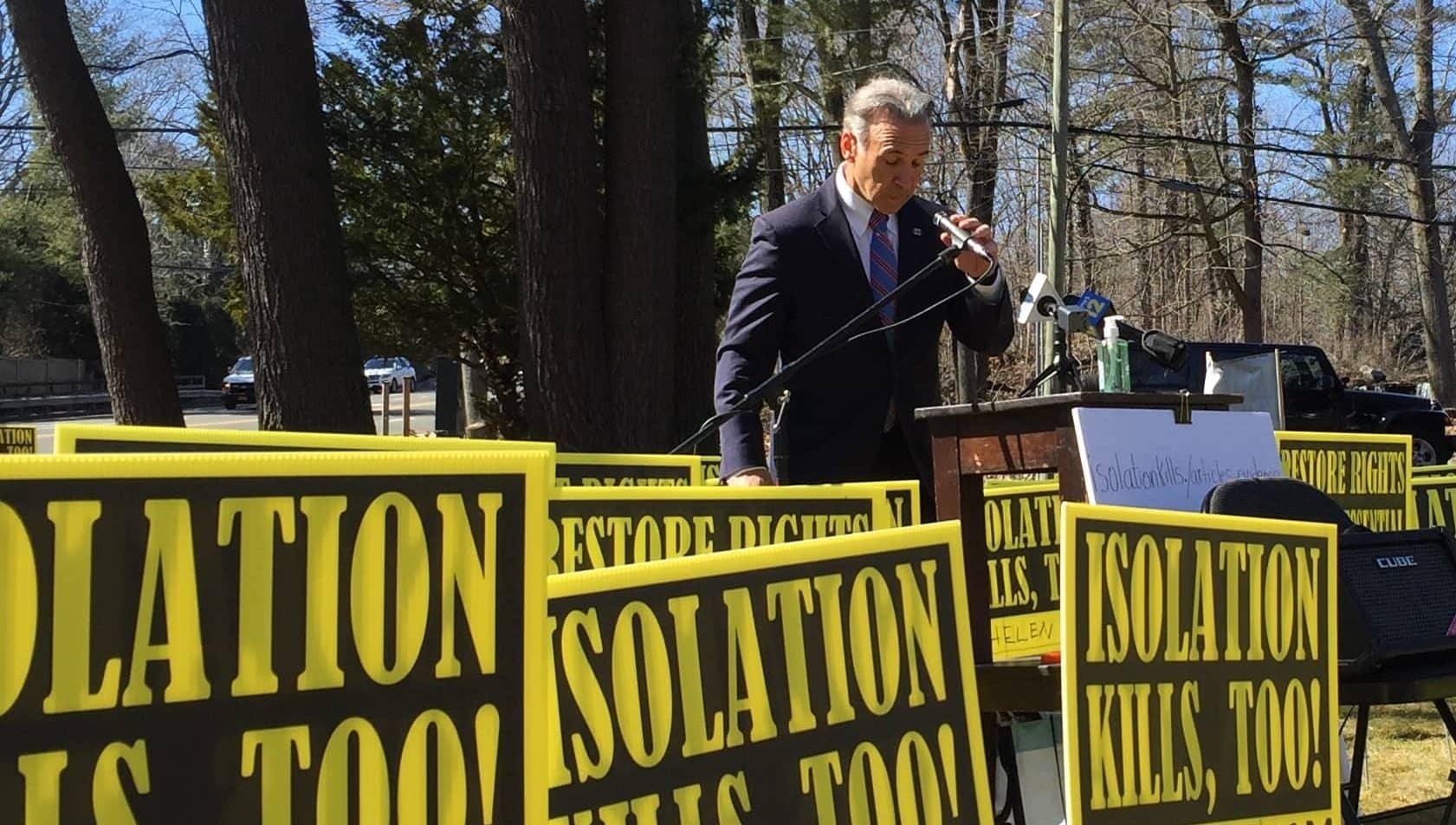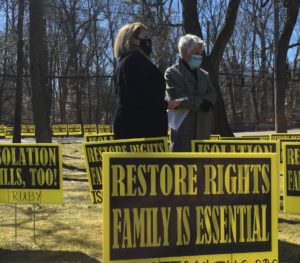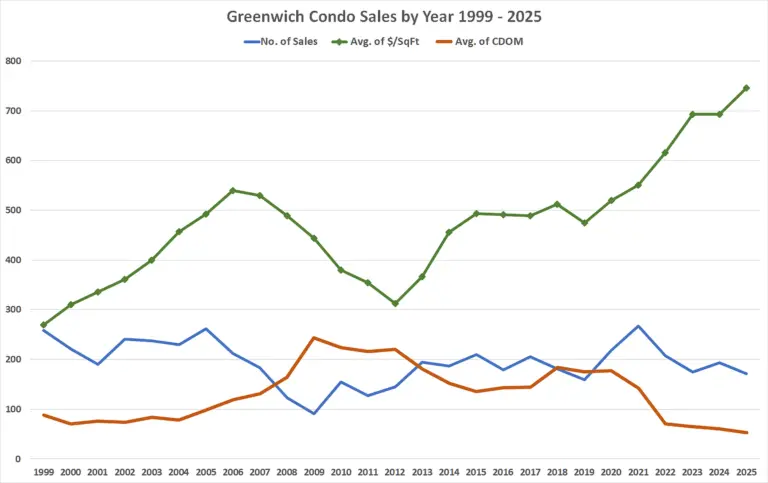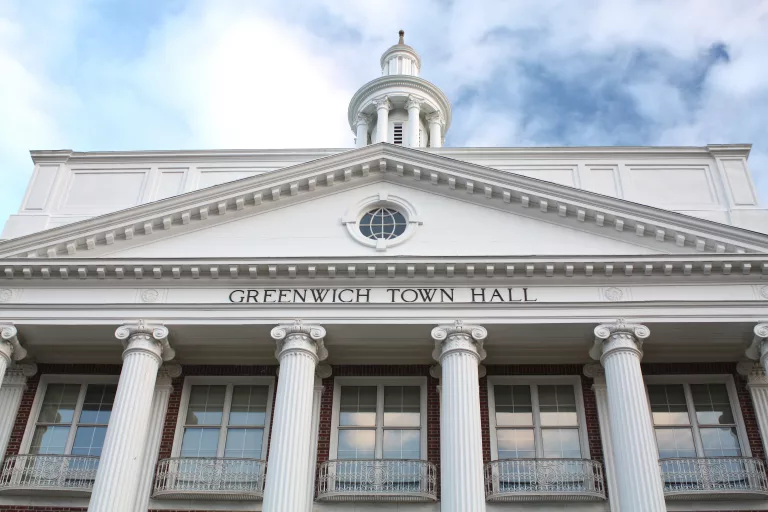
By Kris Herndon

On Monday, a crowd assembled to protest the continued ban on visiting nursing home residents, and others in long term healthcare facilities, due to COVID-19.
United under the slogan “Isolation Kills, Too,” a coalition of caregivers, advocacy groups, and organizers across 15 states hopes to get the message out that the restriction has now in been place for a year, and that, for those unable to see loved ones in person, the resulting loneliness is taking a tremendous toll. Those affected by the ban include residents of nursing homes, senior homes, acute care and assisted living facilities, as well as their families and loved ones.
Sheilah Smith, Co-Chair of the Witherell Family Council at Greenwich’s Nathaniel Witherell residence, was the first to speak. She reminded the assembled crowd that the public may not be aware that the visitation ban is a year old, dating from March 13, 2020, when governors enacted it across the United States as it became clear that the virus was having a disproportionate impact within those facilities.
“We’re calling it a BANniversary,” Smith said.
Smith said that while the majority of nursing home residents are now vaccinated, some healthcare workers have refused the vaccine. “That just prolongs the isolation and contact starvation in these homes. We have a vaccine now. Let’s all join together to kick COVID out of our community.”
First Selectman Fred Camillo then took the podium, acknowledging that the virus has been “horrible,” but that, in some cases, the effect of isolation has been much worse. “We all know people that have passed on, that have died alone — which should never, ever happen,” he said.
Camillo said he had heard many concerns from residents over the past year. “I was happy that our facility here in Greenwich did amend their policies,” he said, adding that although there were still concerns, the takeaway was that “policies can be adjusted, and they will. So better days are ahead.”
Echoing Smith’s comments, he added: “Encourage people to get vaccinated. This has gone on long enough.” Camillo concluded on a note of optimism: “I am hopeful. Things are getting better.”
Mairead Painter, State Ombudsman for Nursing Homes, said that the unprecedented nature of the pandemic and a disconnect between State and Federal guidance had combined to create a situation that she called both challenging and heartbreaking.
Painter spoke of how long term care in the state of Connecticut has evolved: “During the past twenty years, it went from being a very medical model, to a more person-centered and holistic model.” But, speaking to this reporter before the rally, she noted that the Department of Public Health has to follow Federal guidance. During the current crisis, for administrators, that has sometimes been challenging: “They’re not able to honor what the residents have experienced.” And for family members who had chosen to place loved ones in care facilities where visits weren’t limited, “the pandemic changed that.”
“On a personal level, just hearing these stories and meeting the families has been heartbreaking,” Painter said. During the past year, Painter has used Facebook Live to connect with the public, allowing them to “ask questions and share information.” That has been a silver lining: “There’s a higher level of accountability and expectation that we never would have had without that exchange,” she said, noting that she plans to keep the Facebook Lives going.
During the rally, several speakers spoke movingly of the deep emotional toll the ban on visitation has exacted. Some shared personal stories of loved ones who had died in isolation during the past year. Jenny Larkin, who hosted the rally, brushed away tears as she recounted the story of her mother, who had found the love of her life in a fellow resident in the facility where she lived. But when COVID precautions forced the couple to live on separate floors, Larkin said, the resulting isolation and loneliness caused her mother’s health and well-being to decline. Still in isolation, and despite the hopeful prospect of the vaccine, she passed away earlier this year.
Nikki Negrea’s mother, a resident of Nathaniel Witherell, also passed away in isolation this year. “I know that my Mom died of loneliness,” Negrea said. Negrea’s mother, aged 93, was in good health for her age, and Negrea explains that loneliness, not COVID, was the cause of death:
“Mom got COVID in April of 2020, she was put in the COVID wing, she had COVID for two weeks, and she recovered. She recuperated just fine, she was sent back to her normal floor.” At first, visits were outdoors only, socially distanced and chaperoned. “No hugging, no kissing. My mom is hard of hearing, so we had to shout.”
That was difficult enough. But, although Negrea’s mother had recovered from COVID, her situation worsened when lockdown became total: “When they shut down completely we were not allowed visits at all.” Zoom and other virtual options were confusing and unsatisfactory. The only way to have a real visit was when Negrea took her mother for medical care offsite: “So that’s what I did. I took her to the dentist, the cardiologist.”
“I basically had to say goodbye to my mother during a visit that I had scheduled with the dentist,” Negrea recalls. They had a makeshift party with flowers in the dentist’s parking lot, then took a drive together that would prove to be their last. “I took her to Tod’s Point and we drove around the beach, and that was the last time I saw my mother alive.”
She says she felt fortunate even to have that last goodbye, which many have been denied: “I am not the only story. People like my Mom are dying by the hundreds if not thousands from loneliness and isolation.” She hopes her loss will help others understand the impact is profound and personal, rather than abstract, and that the week’s events will serve as a call to action for policymakers. That sentiment was echoed by other speakers throughout the event.
The rally kicks off a weeklong series of events and initiatives to raise awareness and to call for change. The week’s events will culminate on March 13, with vigils to commemorate those who have died in isolation.
Participating states include California, Connecticut, Florida, Illinois, Kentucky, North Carolina, North Dakota, New Jersey, Pennsylvania, Tennessee, Texas, and West Virginia. To donate, to learn more about the campaign, or to view a schedule of planned events, please visit www.isolationkills.org.




